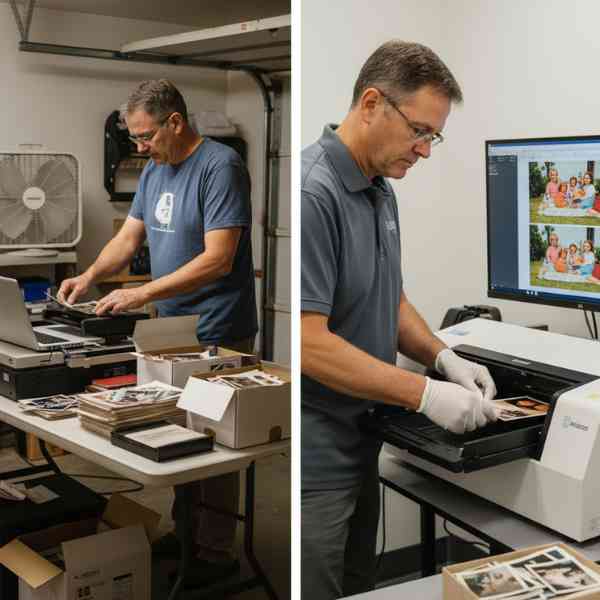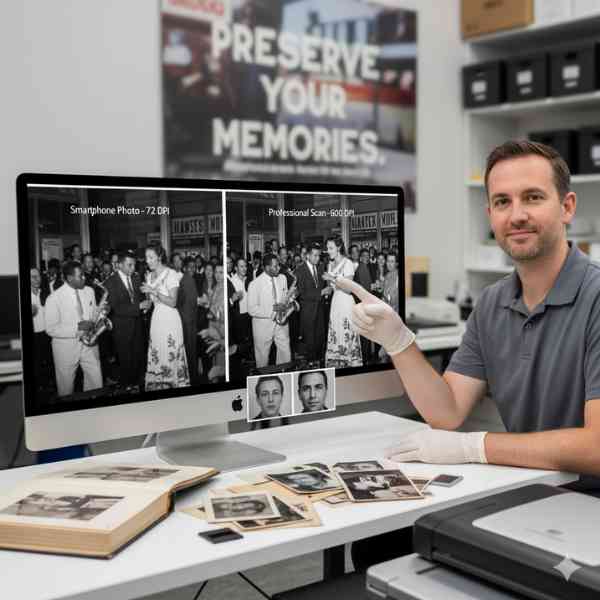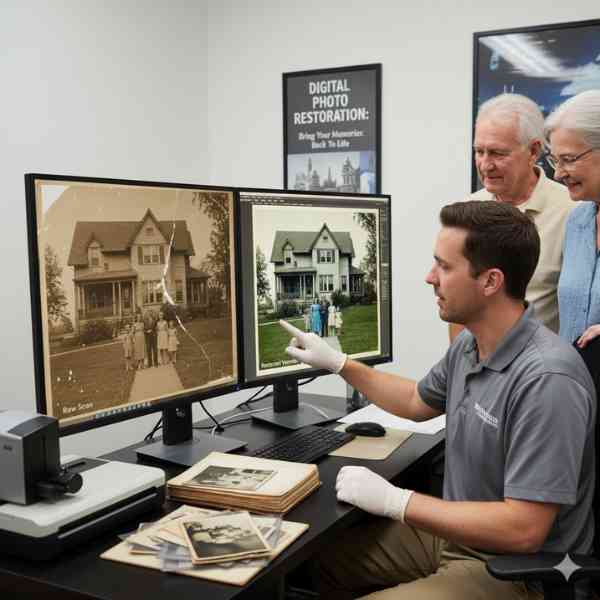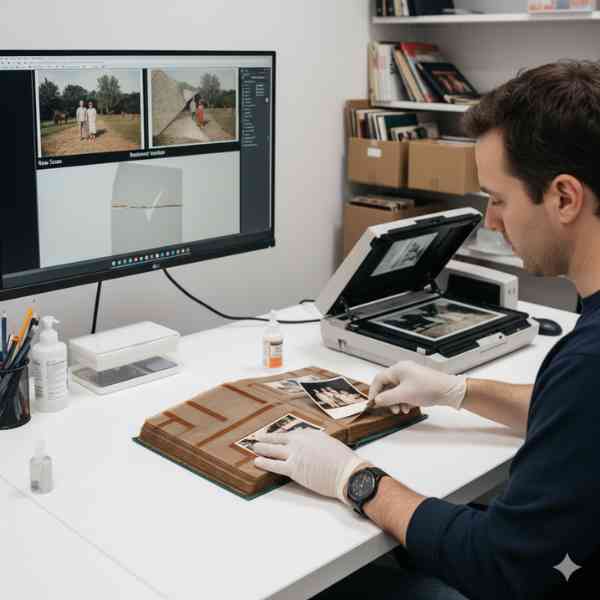Preserve Your Memories with Professional Photo Scanning in Kansas City
Photo Scanning in Kansas City, MO
Families across Kansas City trust professional photo scanning to protect fading memories before they disappear. We digitize prints, slides, negatives, and album photos using high-resolution equipment that captures details your phone camera misses. Most projects finish within one week, so you can share digital files with relatives or start your memorial project quickly. Our photo restoration service handles fragile images from any era safely, whether they sat in your grandmother's attic or your basement for decades.
Professional Photo Scanning Protects Your Images Better Than DIY Methods
Sorting through inherited photo boxes or cleaning your basement reveals decades of family history. Professional scanners capture detail that flatbed units miss while protecting fragile paper from handling damage. Home scanning projects often leave photos sitting in humid garages during Kansas City summers, which warps prints and fades color. We control temperature and humidity throughout the digitization process.
Flatbed scanners at home press photos against glass, which can crack brittle prints or scratch surfaces. Our commercial equipment uses gentle contact that preserves delicate emulsions. You avoid buying expensive hardware that produces lower-quality results. Each image receives individual attention rather than batch processing that blurs edges.
DIY scanning takes hours of your time positioning prints and adjusting settings. We handle hundreds of photos per session while you focus on organizing digital files. Professional photo restoration services in Kansas City return your originals in the same protective sleeves you sent them in.


High-Resolution Scanning Captures Every Detail Your Camera Missed
Families in Brookside and Waldo preparing anniversary or memorial projects need scans that reveal fine details. A 600 dpi scan lets you crop faces or enlarge prints without losing clarity. Phone cameras capture only what you see on screen, missing grain structure and subtle textures in the original photo.
High-resolution scanning preserves details you forgot existed. The embroidery on your grandmother's dress becomes visible again. Background signs and storefronts that document Kansas City's history stay sharp when you zoom in. Photos from the jazz era or Negro Leagues games need this level of precision to preserve fine details like uniform lettering and crowd faces.
We scan prints at 600 dpi minimum and slides at 3000 dpi. This resolution protects against future technology changes since displays keep improving. Your grandchildren can view these images on screens that don't exist yet without pixelation. Slides and negatives hold more information than prints, so higher resolution extracts every detail the film captured.
Damaged Photos Can Be Restored During the Scanning Process
Water-stained or faded images from basement floods or attic storage still hold recoverable memories. Digital restoration fixes tears, removes spots, and rebuilds missing corners before we deliver your final files. Older homes in neighborhoods like Hyde Park often store photos in damp basements where moisture damages prints over decades.
We scan the damaged photo first to capture what remains. Then our restoration process removes water stains that obscure faces and landscapes. Torn corners get rebuilt using texture from undamaged areas. Faded color returns to match how the photo looked when it was new.
Small spots and scratches disappear without affecting the original image quality. Creases from folded wallet photos flatten digitally. You receive both the raw scan and the restored version, so you control which file to share. Some families prefer seeing the age in their photos while others want crisp reproductions.
Restoration works best when combined with high-resolution scanning. More detail in the original scan gives us more information to repair damaged sections.


Organized Digital Files Make Sharing Family Photos Simple
Kansas City families preparing reunion slideshows or memorial tributes need files they can find quickly. We label files by year and person so you can build photo books or send images to relatives instantly. Searching through boxes for one specific photo wastes hours during event planning.
Digital organization lets you group photos multiple ways without creating duplicate prints. Sort by decade to watch your children grow up in sequence. Group by Kansas City landmark or neighborhood to identify locations in undated photos. Tag faces so cousins can find pictures of their grandparents.
We deliver files in folders that match how you want to use them. Wedding photos separate from vacation shots. School pictures organize by grade level. You can create a memorial slideshow in minutes instead of spending days sorting physical prints.
Organized files also protect against loss. When you know exactly which folder holds your father's military service photos, you can back them up separately. Sharing becomes simple when you send one labeled folder instead of asking relatives to sort through hundreds of unnamed files.
Album Photos Transfer to Digital Format Without Damage
Magnetic albums or bound scrapbooks from the 1970s through 1990s hold photos you can't remove safely at home. Professional removal lifts photos from sticky pages without tearing corners or leaving residue. Kansas City's heat bakes photos onto magnetic album pages over time, making home removal nearly impossible.
We use specialized tools that slide under photo corners to break the adhesive bond gently. Each image lifts cleanly without pulling away the photo's back layer. Sticky residue that remains on the print gets removed before scanning so your digital file shows a clean image.
Bound scrapbooks require different handling than loose prints. We scan album pages intact when removing photos would cause damage. You get digital copies of the entire page layout, preserving captions and decorations your relatives added. Some families prefer this method because it maintains the album's original design.
Albums with plastic sleeves or corner mounts need no removal at all. We slip photos out, scan them, and return them to their protective pages. Your albums stay intact while you gain digital access to every image inside.


Proper File Formats Keep Scanned Photos Safe for Decades
Residents in Prairie Village and Leawood archiving family history for grandchildren need file formats that last. TIFF files preserve full scan quality while JPEG offers smaller size for easy sharing. Cloud storage protects Kansas City families from tornado or fire loss of physical photos.
TIFF format saves every detail our scanner captures without compression. These files take more storage space but give you the master copy for future projects. Use TIFF when you plan to enlarge photos or need archival quality. Professional printing services prefer TIFF files because they contain more color information.
JPEG files compress image data to create smaller files you can email or post online. We save JPEGs at high quality settings so you don't see pixelation or artifacts. Most families use JPEG for sharing photos with relatives and displaying images on screens.
You receive both formats so you choose which file to use for each purpose. Store TIFF files on an external drive as your backup archive. Keep JPEGs on your phone or computer for daily access. Cloud services like Google Photos accept both formats and let you access images from any device.
Save copies in three locations to prevent loss. One external hard drive at home, one at a relative's house, and one cloud account protects against any single failure. Update your backups annually as you add new scanned photos to your collection.
Photo Scanning FAQ
What is the best way to digitize old photos in Kansas City?
Gather all photos, slides, and negatives you want preserved. Remove images from albums if corners allow safe lifting. Group by decade or family member for easier organization. Choose a Kansas City photo restoration service with archival scanning. Request 600 dpi minimum for prints and 3000 dpi for slides. Store digital files in TIFF or high-quality JPEG format. Keep copies on two devices plus one cloud backup.
How long does photo scanning take in Kansas City?
Most orders of 100–500 photos finish within 5–7 business days. Larger collections take two weeks depending on the number of images and whether you request restoration work. We contact you with a specific timeline after reviewing your photos.
Can you scan photos from old albums without damaging them?
Yes, we lift images from magnetic or glued pages using safe removal techniques. We use specialized tools that slide under corners to break adhesive bonds gently. Each photo lifts cleanly without tearing or leaving residue on the print.
What resolution should I scan old photos at?
600 dpi works for standard prints and gives you room to crop or enlarge without losing detail. Slides and negatives need 3000 dpi for best quality because they contain more information than prints. Higher resolution protects your investment as display technology improves.
Is it better to scan photos at home or use a professional service?
We use commercial scanners that capture more detail and handle fragile images safely. Home flatbed scanners can crack brittle prints or miss fine details. You also avoid spending hours positioning photos and adjusting settings yourself.
What's the difference between photo scanning and photo restoration?
Scanning creates a digital copy of your photo exactly as it looks now. Restoration fixes damage like tears, fading, or stains in the digital file after scanning. You can choose scanning alone or add restoration to repair damaged images.

Don't wait for your old 8mm film, slides or VHS tapes to fade away. Call or contact Picture This Video Inc now for a free estimate and quick, reliable service.
Monday - Friday: 8am - 5pm
Saturday & Sunday: Closed
Powered By Local Biz Domination
